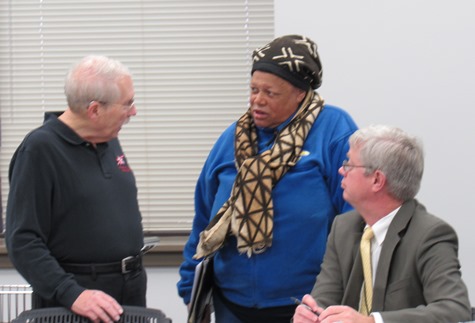
by Mary Rupert
At the election canvass on Nov. 18, a voter talked to the election commissioner and the media about getting the wrong ballot at the polls on Election Day, Nov. 5.
Mary Martin, who said she lives in the Bonner Springs-Edwardsville No. 204 School District, said her ballot had both District 204 and the Kansas City, Kansas, Board of Education District 500 candidates on it.
The Board of Canvassers was not allowing any public comments during the official meeting Nov. 18, but Martin talked to individuals during breaks in the meeting.
Martin said she only voted for District 204 candidates. Her mother, Shirley Ikerd, also said she received a ballot with both races on it. They were both in precinct 9-14.
Ikerd, who also said she lives in the Bonner Springs-Edwardsville School District, said she voted for her friend, Dr. Valdenia Winn, who ran for re-election to the KCK school board. “I voted for who I wanted to win,” she said. She added she didn’t vote for the District 204 candidates.
Wyandotte County Election Commissioner Bruce Newby said he was hearing it all for the first time on Monday and questioned why they would wait almost two weeks before telling the election office about it.
Martin said she called her friends about it right away, but didn’t report it to the election office until Monday.
Another Wyandotte County resident in the same area, Gina Grady, told the Wyandotte Daily she also received a ballot with both District 204 and District 500 candidates on it. She said she lives in the Bonner Springs-Edwardsville district, and did not vote for any District 500 candidates.
“I didn’t tell them,” she said. “At the time I didn’t think anything about it. I didn’t know if it was regular practice or not. As I found out, it’s not regular practice.”
Another Wyandotte County resident, who lives in Edwardsville, said she didn’t notice anything wrong with her ballot.
Martin said she thinks a new election should be held, but she had heard it would cost $70,000 or more. She said on Monday that she is going to fill out a complaint form.
“2020 is coming up and it’s going to be crazy,” Martin said. “Who knows what we’re going to see in 2020. I want to see a clean and fair election.”
Newby, however, doubted that their ballots had two school board races on it.
He said the precinct is split between the KCK and Bonner Springs-Edwardsville school districts. While the voters should have received the correct ballot, the voters still have the responsibility to look at it and tell the election judges at the polling place if they received the wrong ballot, he said. Then the election judge would give them the correct ballot. He added that in 99.9 percent of the cases, the voter receives the correct ballot.
While Martin said she thinks a new election should be held, Newby said there’s not grounds for it. The vote difference between fourth and fifth place in the Bonner Springs contest, for example, was greater than the amount of votes in question, he believes. He did not think the outcomes would change. In the KCK district, the distance between fourth and fifth place was around 200 votes. (The top four candidates advanced.)
Also, he said it is not up to the election commissioner to call a new election – that would be up to one of the school districts affected. Local candidates who want a recount have to pay about $3,000.
Recounts that have been held in the past have usually not come out very much different from the original count. For example, when Nathan Barnes had a hand re-count of ballots, the result was the same, Newby said.
Martin also was critical of the way a state constitutional question on the census was handled at polling places. There was a display of information on a table that was in sight of voters, and also, a card was handed to voters after they voted urging them to participate in the census.
Martin said she believed that was “electioneering,” or distributing information at the polling place, which is prohibited in general by election laws.
About the constitutional amendment, Newby said the information display was authorized by the Kansas secretary of state. The secretary of state’s office had run it by the Kansas Governmental Ethics Commission previously, which had no problem with it, Newby said.
The state ethics commission felt the statement was sufficiently generic, just providing information, he added. It didn’t tell people how to vote, just gave them more information on the constitutional question, he said.
A majority of the Legislature approved putting the constitutional amendment on the ballot. Displaying the voter information on the amendment wasn’t his policy decision; it was from the state level, and the state ethics commission was satisfied with it, he said.
